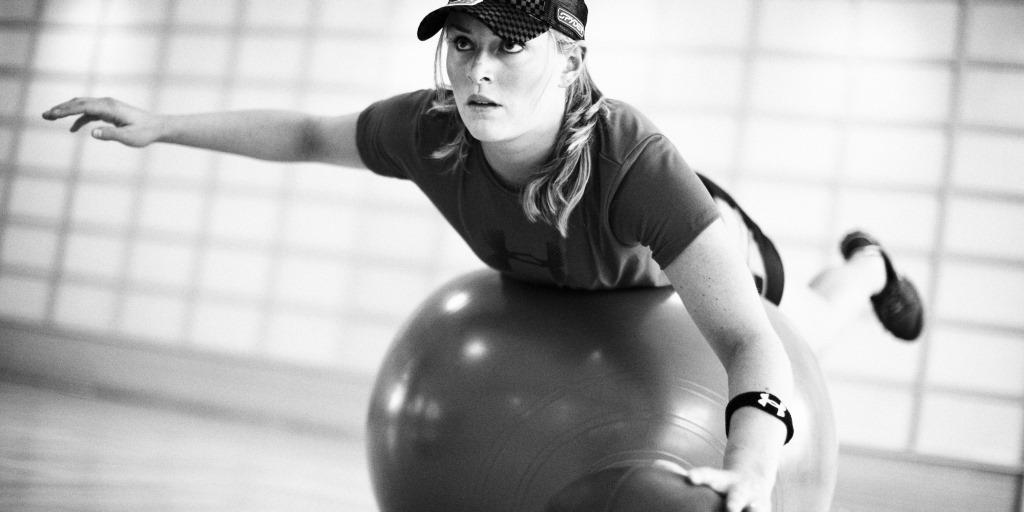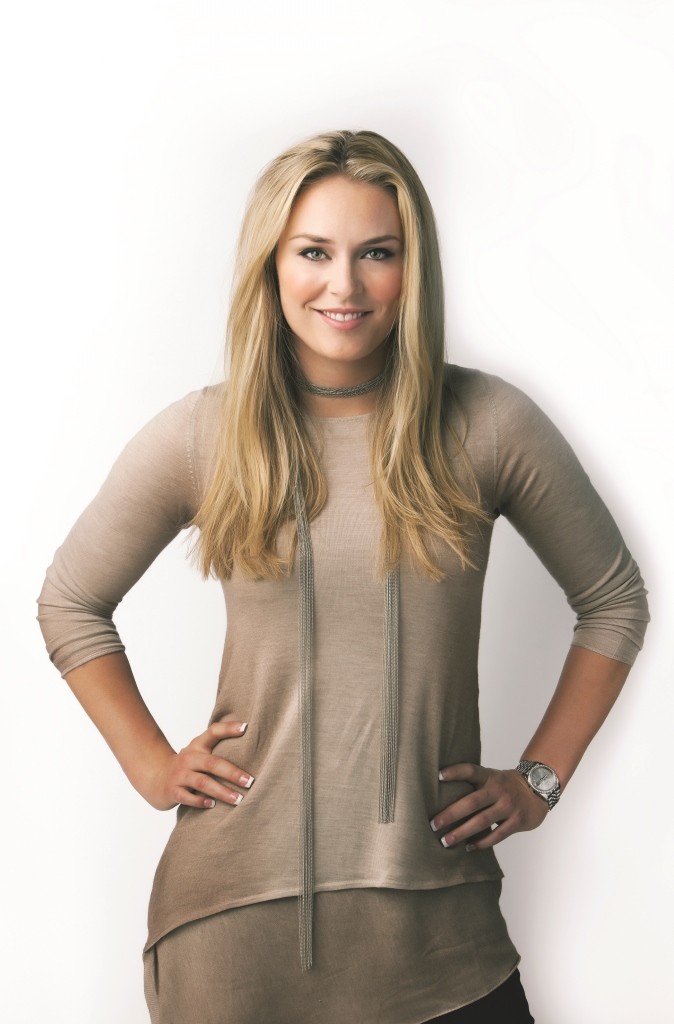About nutrition, training and the next generation of champions
At 29, Lindsey Vonn is arguably the greatest American ski racer in history: She’s won Olympic gold and bronze medals, two gold and three silver World Championship medals, and four overall World Cup titles. And though a recent injury has forced her to sit out the rest of this ski season—including an Olympics where she was heavily favored to win several events—Vonn continues to add impressive titles to her rèsumè. Most recently: businesswoman.
Vonn is a founding partner and spokesperson for Playmaker Nutrition, which makes supplements for active kids and teens. Discover why Vonn has put her superstar power behind Playmaker, her best nutrition advice for young athletes (and their parents) and why—to the chagrin of parents everywhere—if kids have dessert they should eat it before dinner.
Q & A
Optimum Wellness: You could partner with many companies—why Playmaker?
Lindsey Vonn: As an athlete, I know how important it is to pay attention to nutrition—and nutrition is especially important for children whether they’re athletes or not. But if you look at the supplements out there for kids, they’re all gelatin and corn syrup. These are gluten-free, vegan and don’t have gelatin or corn syrup—it’s the only thing out there like it.
OW: Given what you know now about nutrition, what would you tell your younger self?
LV: I was pretty clueless about nutrition as a kid. Diets have changed a lot too, because back when I was a teenager people were telling me to load up on carbs. I’d tell my younger self that mac and cheese was not the best meal … plus, I ate a ton of the sugariest-possible cereal—that’s like eating solid corn syrup! I’d also get myself to eat vegetables—I’m still not the best at eating them now; I try hard, but I’ve tended to rely on vitamins and supplements.
OW: What tips do you have for parents who are trying to get kids to eat well?
LV: Kids can be so picky, but it’s important for them to get enough of the right calories, so you have to be creative. Sometimes you can puree vegetables and sneak it into mashed potatoes—there are a lot of ways to stealthily mix nutritious foods in. For example, my friend’s son doesn’t like to eat a lot of protein, but he’ll eat fried rice, so we cut
up little, tiny pieces of chicken or scrambled eggs and mix it in with the rice. Then, he’ll only eat it with ketchup, so we give him sugar-free ketchup. Also, obviously, Playmaker supplements are a great way to get all the necessary vitamins that they might not be getting in their daily routine. A gummy in the morning really helps get kids going.
OW: How early do you recommend kids start taking supplements such as Playmaker vitamins?
LV: As early as 3 or 4. If they’re eating regular meals, they can be taking vitamin supplements.
OW: How did your nutrition affect your performance as a kid and teenager?
LV: When I was younger I traveled a lot just with my team so my parents weren’t with me, and I was under the impression that Häagen-Dazs vanilla fudge ice cream was the best pre-race meal ever … not a good idea. Over time I learned that oatmeal is a better choice.
OW: What other advice would you give young athletes?
LV: I know kids don’t like to drink water, but it’s so important to stay hydrated, so get as much water down as possible. But not sodas—stay away from sugary drinks and foods as much as you can. If you do have ice cream or other sugar, it’s best to have it in the late afternoon, just before dinner, because the protein in your dinner will offset your body’s insulin response from the sugar. And athletes expend more energy, but all kids need good nutrition so this advice applies to all of them.
OW: What is your current nutrition strategy?
LV: I ate Paleo [no grains, legumes or added sugar, and minimal dairy] for two and a half years, but now I’ve added more low-glycemic carbohydrates in the morning and afternoon for more energy and more protein and vegetables in the evening. Some low-glycemic carbs I like to eat are quinoa, Thai rice noodles or pumpernickel bread—they don’t give me as high of an insulin response.
OW: What does a day look like for you meal-wise?
LV: Breakfast is three scrambled eggs, a piece of pumpernickel bread with butter (no jam), coffee with agave, and vanilla Greek yogurt or plain with a little agave. No coffee on race days though—it’s too much up and down; I need steady energy levels. I also have more carbs on race days—maybe two pieces of bread, or I add oatmeal and fruit. Lunch is a large salad with quinoa and chicken and maybe some grilled vegetables on top, as well as pine nuts or sliced almonds. Dinner is a healthy protein—I have a lot of fish because it has tryptophan in it, which helps you sleep well—plus maybe a small salad and a sweet potato or asparagus—always low carbohydrates at dinner.
OW: What’s your favorite indulgence or “cheat” meal?
LV: I’m really diligent during the season, but sometimes in the summer I’ll have a little frozen yogurt for an afternoon snack. During the season, with racing all day and then media, working out and getting therapy, I have to prepare snacks and meals beforehand, so there’s not even an opportunity to sneak in any cheat foods. Frozen yogurt isn’t as great in the winter anyway, right?
OW: What supplements do you currently take?
LV: Vitamin C is the main one, especially when I’m traveling. And then a women’s multivitamin—or I actually eat the kids’ gummy; I don’t know why they’re just for kids and teens, because those things are delicious! I also take glucosamine for my joints and amino acids to process the proteins when I’m lifting weights.
OW: When you’re on the road, do you make your own food?
LV: It depends; when I’m on my bus, I usually prepare all my food—or my sister does. But it’s difficult to eat well when we stay in hotels. We don’t usually have kitchenettes, so we have to rely on hotel food. I usually go back and talk to the chef about my meal plan. Usually they’re really considerate of that, but it’s still difficult to make sure you’re getting what you need.
OW: Is it harder to eat well when you’re competing in Europe?
LV: Definitely. It also varies from country to country. In Italy, they serve pasta with every meal. In Germany, it’s a lot of meat of potatoes. Obviously I’m stereotyping, but it’s definitely not the same as it is here in the U.S., and things aren’t as easily accessible. Supermarkets are closed all day Sunday, open for three hours on Saturday and then they close at 5 p.m. every day. When am I supposed to go to the grocery store? It’s just not as easy to eat the way you want to when you’re in Europe.
OW: Do you eat energy bars and the like or do you rely solely on whole foods and supplements?
LV: I used to drink a protein shake in between my runs in GS or slalom, but I found that if you have too much protein while you’re working out, it takes too much energy for your body to process it, which is energy your body then can’t use for fuel. So now I’ll have a pumpernickel sandwich with almond butter and apple or banana, so I get carbs, proteins and fat all together.
Photo by Don Cudney


